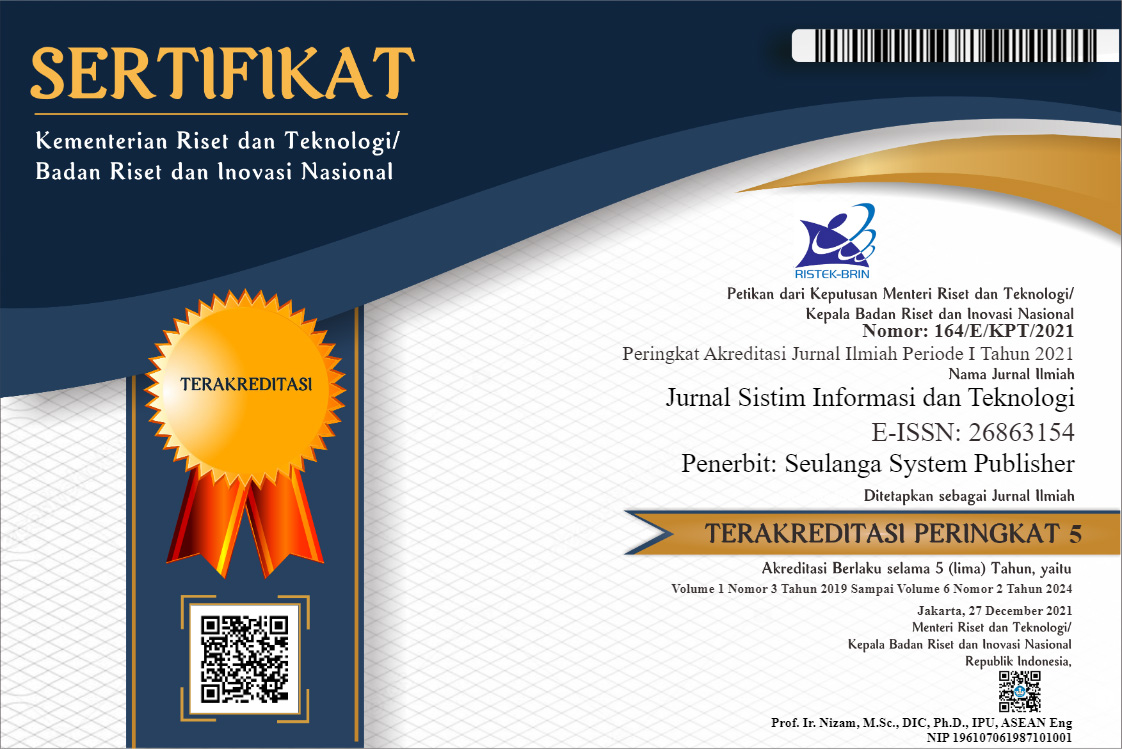Implementation of Digital Policy Experimental Analysis in Higher Education on The Level of Graduates' Absorption in Industry
DOI:
https://doi.org/10.60083/jsisfotek.v6i2.348Keywords:
University, Wage, Labor Market, Education LevelAbstract
This research aims to analyze the impact of deregulation of the university system on the labor market. We used a sample of 100 people in this research. The research results indicate that without deregulation, most individuals who access university studies would likely only pursue their education. This study uses the year or birth cohort as an exogenous characteristic to implement the instrumental variable strategy. This makes it possible to estimate the causal impact of university education on several employment outcomes, especially wages and labor informality. An admitted university estimates that each year of study will increase the salary. We estimate the cumulative impact of access to university studies. However, the effect of university education on wages turns out to be heterogeneous, depending on individual socio-economic characteristics. The effect tends to be higher in women and individuals in the highest family income quintile. The evidence aligns with other international research regarding the salary premium of university education and its impact on human capital. The results show that for each year of university study, the probability of informality in employment decreases, notably reducing the probability of not having an employment contract. However, we found no significant impact on the probability of not having a pension fund affiliation, suggesting a structural dimension of informality in the labor market that may not be dependent on workers' education level.
References
Jayanti, D., Rusmawati, R., & Hartono, H. (2023). Pengaruh Pembelajaran Daring Learning Management System (LMS), Multimedia dan Motivasi Belajar Terhadap Kemampuan Pemahaman Membaca Peserta Didik. Journal on Education, 5(3), 7117-7121. https://doi.org/10.31004/joe.v5i3.1500
Wijaya, L. H. ., & Sholeh, M. . (2021). Evaluation of 2013 Curriculum Implementation In Economic Learning Class Xi In Madrasah Aliyah Dakwah Islamiyah Putra Nurul Hakim Kediri West Lombok. Edunesia : Jurnal Ilmiah Pendidikan, 2(1), 93–103. https://doi.org/10.51276/edu.v2i1.90
Dwi Adventyana, B., Amanah Asdiniah, E. N., Afriliani, M., Magdalena, M., Nurul Fitri, S. F., & Prihantini, P. (2024). Dampak Kebijakan Perubahan Kurikulum Merdeka di Sekolah Dasar Bagi Guru dan Peserta Didik. Journal on Education, 6(2), 11818-11826. https://doi.org/10.31004/joe.v6i2.4980
Sukma, H., Hufad, A., & Sulistiono, E. (2024). Analisis Perbandingan Kurikulum Pendidikan Korea Selatan dan Indonesia. Journal on Education, 6(2), 12746-12754. https://doi.org/10.31004/joe.v6i2.4949
Wagiono, F., Shaddiq, S., & Syahidi, A. A. (2020). Pengembangan Pkn Di Era Generasi Millenial Berbantuan M-Learning (Mobile Learning) Pada Gadget Pembelajaran Berbasis Cooperative Learning Bermuatan Karakter. Edunesia : Jurnal Ilmiah Pendidikan, 1(3), 63–72. https://doi.org/10.51276/edu.v1i3.64
Permatasari, N., & Khotimah, K. (2023). Maksimalisasi Manajemen Kurikulum dalam Meningkatkan Kurikulum di MTs Al-Hikmah Lamongan. Journal on Education, 5(2), 4654-4663. Retrieved from https://jonedu.org/index.php/joe/article/view/1195
Rahman, K. A. ., Sihombing, J. ., Surbakti, Y. M. B., Karo, D. B. ., & Fadhilah, B. D. . (2023). Curriculum Management Paud in Integrated Islamic Kindergarten Fania Salsabila Barokah Jambi. Edunesia : Jurnal Ilmiah Pendidikan, 4(1), 372–380. https://doi.org/10.51276/edu.v4i1.306
Agustina, R., Agustina, A., Juita, N., & Pratama, E. Y. (2024). Penguatan Pendidikan Karakter dalam Implementasi Kurikulum Merdeka: Kajian Literatur. Journal on Education, 6(2), 11431-11439. https://doi.org/10.31004/joe.v6i2.4940
Arifin, N., Jihan, J., Edy Nurtamam, M., Cendrawati Ramli, A., Wonmaly, W., & Pabisangan Tahirs, J. (2023). Strategi Pengembangan Kurikulum Merdeka Belajar Kampus Merdeka Berbasis Individual Differences Pada Perguruan Tinggi. Journal on Education, 6(1), 3500-3511. https://doi.org/10.31004/joe.v6i1.3420
Wijaya, L. H. ., & Sholeh, M. . (2021). Evaluation of 2013 Curriculum Implementation In Economic Learning Class Xi In Madrasah Aliyah Dakwah Islamiyah Putra Nurul Hakim Kediri West Lombok. Edunesia : Jurnal Ilmiah Pendidikan, 2(1), 93–103. https://doi.org/10.51276/edu.v2i1.90
Rifa’i, S., & Darmiyanti, A. (2023). Implementasi Peraturan Wali Kota Bandung Nomor 004 Tahun 2019 tentang Kurikulum Pendidikan Karakter dalam Meningkatkan Mutu Lulusan. Journal on Education, 5(2), 2968-2980. https://doi.org/10.31004/joe.v5i2.948
Nurzen, M. (2022). Teacher Readiness in Implementing the Merdeka Curriculum in Kerinci Regency. Edunesia : Jurnal Ilmiah Pendidikan, 3(3), 313–325. https://doi.org/10.51276/edu.v3i3.424
Windayanti, W., Afnanda, M., Agustina, R., Kase, E., Safar, M., & Mokodenseho, S. (2023). Problematika Guru Dalam Menerapkan Kurikulum Merdeka. Journal on Education, 6(1), 2056- 2063. https://doi.org/10.31004/joe.v6i1.3197
Downloads
Published
How to Cite
Issue
Section
License
Copyright (c) 2024 Jurnal Sistim Informasi dan Teknologi

This work is licensed under a Creative Commons Attribution 4.0 International License.









